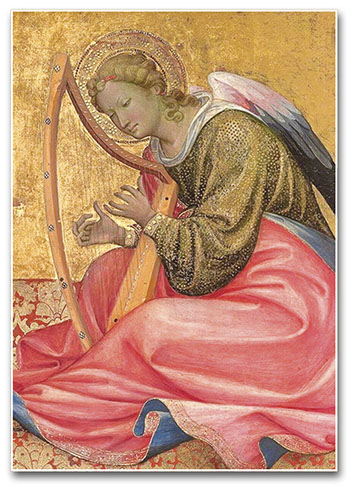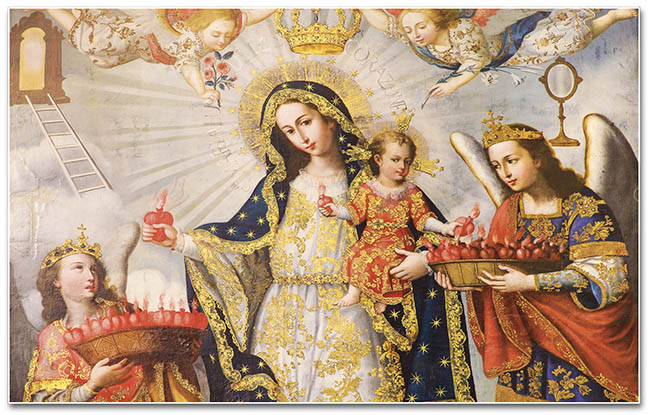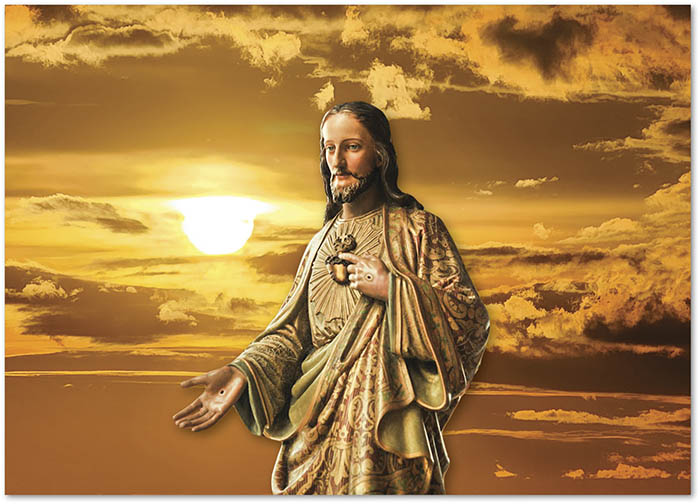One of nature’s most beautiful kinds of movement is the play of water throughout the universe. The clouds pour themselves out onto the ground below, watering and preparing the soil for the germination of plants, which embellish the earth and provide food, while other waters are solidified into immense glaciers. Then comes the summer, and the vehement heat forms vapor: the clouds are formed, followed again by rain, dew, frost or snow. It is the perpetual movement of an inanimate being that ascends in one state, and precipitates in another. Humanizing this mineral substance, one would say that this change and exchange of attributes is a rational one, an effect that returns to its cause as a duty of gratitude.
What a pale symbol of the relationship that should exist between Creator and creature! Nature is generous and obeys the laws of its driving force; man, however, tainted by egoism, tends to close in on himself instead of making his life a continuous act of praise, gratitude and restitution.
Creation and the Redemption: works of love
Divine Providence could not give us greater proofs of love. It has created the heavens and the earth, plants, seas, rivers, fountains, every kind of beast, reptile and bird; all of these creatures serve us without ceasing. They are a reflection of the Creator for us and guarantee our survival. Is that all? No.
“I have loved you with an everlasting love; therefore I have continued my faithfulness to you” (Jer 31:3). God created us in His image and likeness, endowed us with perfect powers, understanding and will – an immortal soul destined for eternal beatitude.
However, wanting to come into contact with us in a more tangible way, “God so loved the world that He gave His only Son, […] that the world might be saved through Him” (Jn 3:16-17). His love for His beloved creature overflowed its limits! Yes, God was seen on earth and lived among men.
The Incarnate Word came not only to be an expiatory victim, offering His life as a ransom for our faults; if this had been so, perhaps He would have died with the innocent children immolated by Herod. But, being the expression of divine love, He wanted to make every step of His life a testimony to His unfathomable charity.
For thirty-three years He breathed our air, He lived with those closest to Him under the veils of humanity. He gathered the Apostles around himself, had compassion on the hungry crowds, welcomed the little children, wept with Martha and Mary over the death of His friend Lazarus, praised upright hearts, healed the sick, freed souls from the yoke of the devil, converted the wayward, went in search of sinners, and forgave them with the utmost mercy and compassion; in short, He went about on earth doing good (cf. Acts 10:38).
What does the Heart of Jesus lack?
“Jesus knew that His hour had come to depart out of this world to the Father, having loved His own who were in the world, He loved them to the end” (Jn 13:1)! Yes, the hour had come to feed the fiery furnace of divine love with the wood of the Cross.
What wounded the Sacred Heart most during the Passion was human indifference and wickedness. And since no torment was spared Him, the Father allowed His Only-begotten to suffer at the hands of every category of men: He was persecuted by King Herod, judged by the governor Pilate, betrayed by one of His disciples, abandoned by the Apostles, hated and persecuted by chief priests, scribes and Pharisees; He was outraged by Gentiles, condemned by His own people; crucified by soldiers and, finally, reviled by a vile thief, His companion in death.
Where were the multitudes that had thronged to hear His preaching, that had benefited from so many wonders and prodigies? Where were the sick that were healed, the dead that were resurrected? Where, finally, were those whom He had freed from the clutches of the devil? Many were part of the wicked mob that insulted Him, aggravating the sufferings of His Passion…
He hoped to find at the foot of the Cross hearts burning with filial love, filled with compassion. But… such is ingratitude.
It is true that His Mother was there, and She was enough. But what pain must have been felt by a Redeeming Heart that had come to call all to conversion, to see himself universally abandoned, receiving as recompense betrayal and condemnation to the most ignominious death?
Lacerated in His human figure, His vocal cords were still preserved intact; and that same voice that had said to the Samaritan woman, “Give me a drink” (Jn 4:7), now begged for the water of charity that would repair the enormous ingratitude: “I thirst” (Jn 19:28). He longed for the loving fidelity of those whom He had called. Immersed in abandonment, He gave up His spirit… The Redemption was consummated.
Folly of love, mystery of ingratitude!
“Does He deserve to be loved, or not; this God who has suffered so much, and adopted so many means to engage our love?”1 St. Alphonsus Maria Liguori ponders.
In fact, the Sacred Heart of Jesus, who as God rules over all things and has given us absolutely everything, has a need that only we can fill, according to His words to St. Mechtilde: “I have everything in profusion, except the heart of man which so often escapes Me…”2
Where does our heart go when it is not where it should be?
Like harp strings
Many evils rage in our century, but none seems to be so mysterious and incurable as the torment of the heart. Creatures cannot fully satisfy it, not even carnal affection; pleasures, worldly honours, glories and riches bring nothing but agitation, apprehension and even despair in their wake, giving rise to bloodshed…

But there is really no mystery in this apparently tragic picture. The human heart has an imperative need to be united to Our Lord’s, for between the two there is a profound affinity that dates back to creation.3
As the First-born of God, “all things were created through Him and for Him” (Col 1:16). Thus, it is reasonable to suppose that, in forming the human heart, the Word did so with extremes of care and affection, providing it with the emotions, feelings and needs that He himself would want to experience in becoming incarnate.
In this heart He “embedded such profound aspirations, of which only His Divine Heart could echo and fully assuage. The Heart of Jesus and the Heart of man have thus become like two strings of a harp harmoniously tuned to vibrate together, and so delicately linked to each other that the vibration of one of them would at once provoke a corresponding sound in the other.”4
Thus, if the Heart of Jesus longs for ours and if our heart needs Him, the logical solution to this need is inevitably to give ourselves to Him without reserve, not only out of a duty of justice – because “love is repaid with love” – but to fulfil this unfathomable divine plan.
Surrender and devotion… of what do they consist?
As a vital organ, there are two movements that make up the beating of the heart: systole and diastole. Receiving blood, the heart circulates it throughout the body. If, on the contrary, instead of pumping, it were to only receive blood, death would soon follow. Thus, for the supernatural vitality in us to be complete, it is necessary for us to give constantly to God. We have already received everything; all that remains is for us to give! Now, specifically, what do we need to give to the Heart of Jesus?
When we wish to show our affection for someone, we should begin by not causing them grief, at the very the least. If, then, we intend to love Jesus, we cannot be only souls rich in exterior and merely sentimental exercises of piety. No doubt it pleases Our Lord that we praise Him through worship, vocal prayers and ceremonies; after all, He also praised the Father when He prayed before His disciples. Above all, however, the Redeemer thirsts to possess our hearts.

Like faith, charity must be translated into works. This is how the Lord taught us: “If you love Me, you will keep my Commandments” (Jn 14:15).
“I keep the Commandments!” someone might say. “I do not kill, I do not steal, I pray every day”… There are many souls who limit the practice of the Ten Commandments to a few daily precepts, but who “do not trouble themselves to repress their bad inclinations, to destroy their bad habits, to avoid occasions of sin; who give way as soon as temptation arises, or murmur as soon as contradiction and disappointments befall them. With them, affective love is full of illusions; it is a fire of straw that quickly burns away into ashes.”5
True devotion – expressed in the etymology derived from the Latin devovere, that is, to dedicate oneself – is that which leads us to consecrate ourselves entirely to the service of God, without reserving anything for our own selfishness. “I need hearts that love, souls who make reparation, victims who immolate themselves… but above all, I need souls who abandon themselves,”6 Our Lord declared to Sister Josefa Menendez.
Dear reader, as you conclude these lines, think that at this moment Jesus Christ is standing before you, His Heart on fire, calling out to you: “My son, give Me your heart” (Prv 23:26). God seeks your company, as when He once asked Adam: “Where are you?” (Gn 3:9) Or again, when He asked St. Peter: “Do you love Me?”
What will you answer Him?
Fear not, frail soul; He is your Father, your Lord, your Creator and Redeemer. Do not resist; give Him your heart in an attitude of filial abandonment, knowing that He will provide for all your needs. Fight for Him against sin, renounce worldly pleasures, sacrifice yourself for the expansion of His reign on earth. When you leave this world, you will then see how magnificent a path you have chosen: not the flowery, thornless, lying path, but the way of self-denial, of sacrifice, of the cross, and therefore the way of pardon, a thousand times blessed, that will lead you to Paradise!
Let us ask the Immaculate Heart of Mary to introduce us definitively into the Sacred Heart of her Divine Son, and to prepare a throne in our heart so that her beloved Jesus may reign there.
If a great number of souls are willing to do this, we may be certain that the first melodies will soon begin to sound of a new era, Marian and heavenly, where all hearts will be one with Jesus and Mary! ◊
Taken from the Heralds of the Gospel magazine, #188.
Notes
1 ST. ALPHONSUS MARIA LIGUORI. A prática do amor a Jesus Cristo. 7.ed. Aparecida: Santuário, 1996, p.49.
2 GRANGER, OSB. O amor do Sagrado Coração explicado segundo os escritos de Santa Mechtilde. Belo Horizonte: Divina Misericórdia, 2017, p.85-86.
3 Cf. SCHRIJVERS, José. O Divino Amigo. 2.ed. São Paulo: Cultor de Livros, 2021, p.134.
4 Idem, p.134.
5 MARMION, Columba. Jesus Cristo nos seus mistérios. São Paulo: Cultor de Livros, 2017, p.395.
6 CHARMOT, SJ, François. Apelo ao amor. Mensagem do Coração de Jesus ao mundo e sua mensageira Sór Josefa Menéndez. 4.ed. Contagem: Líttera Maciel, 1998, p.133.

